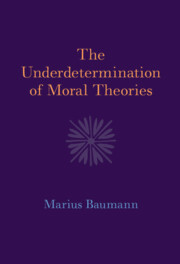Book contents
- Frontmatter
- Dedication
- Contents
- Acknowledgments
- Introduction
- Part I Scientific Underdetermination and the Analogy to Ethics
- Part II Underdetermination in Normative Ethics
- Part III Skepticism and a New Metaethical Position
- Chapter 6 Skeptical Repercussions
- Chapter 7 A New Position in Metaethics
- Chapter 8 Looking Back and Ahead
- Bibliography
- Index
Chapter 8 - Looking Back and Ahead
from Part III - Skepticism and a New Metaethical Position
Published online by Cambridge University Press: 14 March 2025
- Frontmatter
- Dedication
- Contents
- Acknowledgments
- Introduction
- Part I Scientific Underdetermination and the Analogy to Ethics
- Part II Underdetermination in Normative Ethics
- Part III Skepticism and a New Metaethical Position
- Chapter 6 Skeptical Repercussions
- Chapter 7 A New Position in Metaethics
- Chapter 8 Looking Back and Ahead
- Bibliography
- Index
Summary
Chapter 8 concludes the book. I first consider two hypotheses about how we ended up with underdetermination in ethics. One hypothesis refers to advanced dialectics, that is, the way in which defenders of the main traditions have modified their theories in order to avoid counterexamples. The other hypothesis points to the method of reflective equilibrium and how methodological changes might have led to a convergence between the traditions. If correct, these hypotheses help alleviate some doubts about the fact that the analogy to science has only become relevant quite recently. Finally, I return to the puzzle and explain why I take the underdetermination view to offer the best answer to it. Two features make the underdetermination interpretation preferable to its alternatives. First, it can uphold a more plausible semantics, allowing us to take moral explanatory claims at face value. Second, it can uphold the adversarial spirit of the Textbook View, making it less of a miracle why this view has been accepted by a majority of ethicists.
Keywords
- Type
- Chapter
- Information
- The Underdetermination of Moral Theories , pp. 212 - 222Publisher: Cambridge University PressPrint publication year: 2025
- Creative Commons
- This content is Open Access and distributed under the terms of the Creative Commons Attribution licence CC-BY-NC-ND 4.0 https://creativecommons.org/cclicenses/

